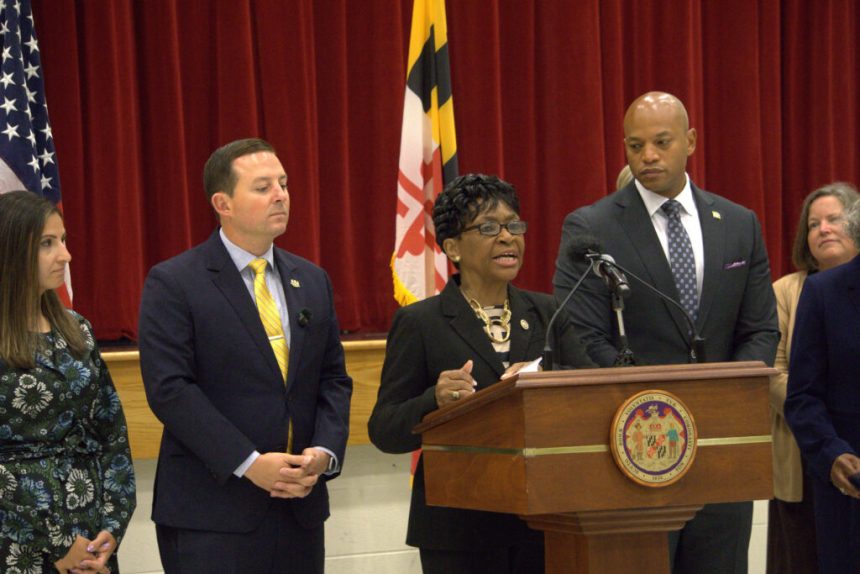Maryland House Speaker Adrienne A. Jones (D-Baltimore County) speaks at a news conference Monday in Randallstown flanked by the governor, Senate president and other Democrats touting an electricity bill refund heading to customers amid soaring energy costs. (Photo by Christine Condon/ Maryland Matters)
Maryland lawmakers want you to read your utility bill particularly closely this month.
A roughly $40 rebate on electricity bills, approved by the General Assembly in April, is finally heading out to customers, with a second round expected in early 2026.
Legislators took $200 million from a state fund for energy efficiency and renewable energy programs to send the refund directly to all residential ratepayers, in hopes of easing the burden of recent rate hikes.
State Democrats touted the refund at a news conference Monday in Randallstown, during which Gov. Wes Moore (D) turned the focus to PJM Interconnection, the operator of the 13-state electric grid that includes Maryland. Moore argued that “outdated processes” at PJM have led to the dramatic bill increases, and renewed his calls for the states to gain a voice on the governing board.
“We demand a seat at the table with PJM, because no longer can they make decisions about us when we’re not at the table in the first place,” Moore said.
In remarks at a PJM summit in Philadelphia on Monday, Pennsylvania Gov. Josh Shapiro (D) was even more direct, floating the possibility that his state, the largest energy generator in the grid, could leave PJM if systematic reforms don’t take place in “months, not years.”
“If PJM refuses to change, we will be forced to go in a different direction, and that will have a significant impact here in this region and across the country,” Shapiro said. “To be clear, that is not a path that I am eager to chart. But I am not willing to stand idly by and let PJM dictate our future.”
Republicans fire back
Maryland Democrats, alongside affordability advocates like the Maryland Office of People’s Counsel, have thrown barbs at PJM as bills skyrocket, arguing that the grid has not moved quickly enough to allow new energy projects to come online, as projected power demand jumps thanks to artificial intelligence and data centers.
Republicans, a minority in both the Maryland House and Senate, have taken a different tack, arguing that the state’s efforts to promote renewable energy projects and reduce greenhouse gas emissions have increased energy costs.
“The Democratic majority has placed the blame on energy companies and on PJM, as if they have no culpability in the skyrocketing energy costs that have our communities in a chokehold,” House Minority Leader Jason Buckel (R-Allegany) said in a statement Monday.
The fund that legislators tapped to pay for the electricity bill refund, called the Strategic Energy Investment Fund, is made up largely of proceeds from a carbon dioxide allowance auction and alternative compliance payments from electricity suppliers that do not meet renewable energy requirements. The fund has ballooned in recent years due to an increase in compliance payments.
“Governor Moore isn’t giving out relief — he’s just recycling ratepayer money Maryland families already paid on their utility bills,” said a statement Monday from Senate Minority Leader Steve Hershey (R- Upper Shore).
PJM, meanwhile, argues that some reforms are already underway, including a fast-track process for “shovel-ready” energy projects to get through the queue and connect to the grid. The grid operator also set a cap on a key energy auction that increased prices for PJM customers, at the urging of Shapiro, Moore and other governors in the region.
The refund rollout
Some energy customers in Maryland may have already received the credit on their electric bills. Others might still be waiting. It all depends on the utility and the billing cycle, officials say.
The Maryland Office of People’s Counsel said the state’s three Exelon utilities — Baltimore Gas and Electric, Pepco and Delmarva Power and Light — began issuing refunds in August, but the process extended into September. Potomac Edison expected to issue its refunds in September. The Southern Maryland Electric Cooperative, on the other hand, got it done in August.
SUPPORT: YOU MAKE OUR WORK POSSIBLE
According to its website, BGE issued the payment by placing its residential customers into one of four tiers based on their average monthly energy usage, with the smallest users receiving a credit of $30.50 and the largest users receiving a credit of $66.
Speaking in her district at the Randallstown Community Center, House Speaker Adrienne A. Jones (D- Baltimore County) said she has seen the strain of inflation and higher power bills in her community.
“I see people working harder than ever to make ends meet. I see people tightening their budgets. And yes, I see people struggling with rising energy costs,” Jones said.
The refund was one small part of a sprawling energy package passed by the General Assembly and signed by Moore. The main bill, called the Next Generation Energy Act, also aimed to increase in-state power generation, including by creating a fast-track for certain eligible projects at the Maryland Public Service Commission, and to curtail utility infrastructure spending and multiyear rate increase plans.
“We may not be able to make energy costs fall overnight, but together, by combining relief with reform, we can make Maryland a more resilient and a more affordable state for everyone,” Jones said.
The refund comes as Maryland consumers are just beginning to see higher bills resulting from an energy auction held by PJM in 2024, which cleared at a historically high price.
The People’s Counsel estimated that, if the costs were spread out over 12 months, customers could expect to see an average increase of about $13 per month on their bills. Baltimore Gas and Electric customers were expected to see one of the larger increases, at $16 per month.
But regulators stepped in, requiring the utility to suspend the cost increases in the summer and winter, when bills are higher because customers are using more energy to heat and cool their homes.
As a result though, typical BGE customers will see an estimated monthly bill increase of $30 this fall and spring, according to the Office of People’s Counsel.









